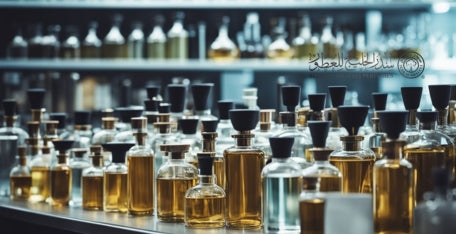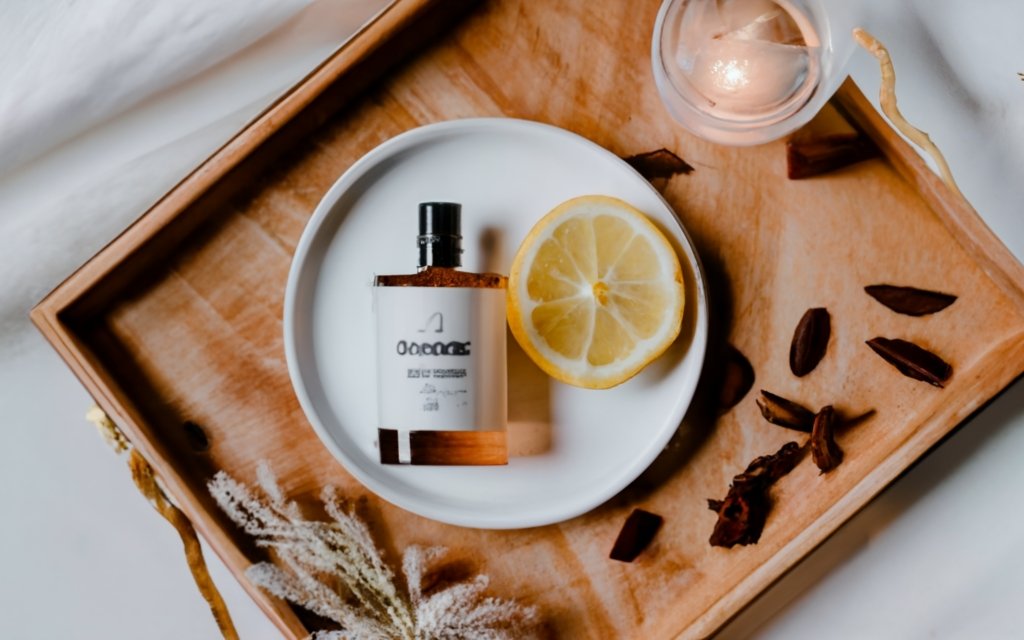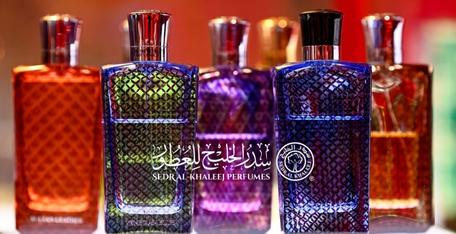How to Choose the Perfect Perfume Ingredients: A Comprehensive Guide for those who want to choose the best perfume

Secondly , you should choose ingredients that suit your skin type. Some ingredients interact well with some skin types, while they fail to respond with other skin types. Therefore, you must choose ingredients that suit your skin type to get the perfect scent.
Effect of aromatic base and supplements
The base notes and complements are among the most important components to consider when choosing perfumes . The aromatic base forms the basis of the perfume and works to stabilize the different flavors in the perfume, while the complements work to give the perfume a unique character and increase its attractiveness.
The aromatic base consists of a group of ingredients that give the fragrance stability and longevity. These ingredients include essential oils, adhesives and stabilizers. Examples of essential oils in the aromatic base include: rose oil, patchouli oil, and amber oil.
As for the supplements , they consist of a group of substances that work to give the perfume a unique character and make it distinctive. Examples of supplements include: musk, vanilla, and spices. These supplements can be used individually or in combination to produce a unique and distinctive fragrance .
The balance of the aromatic base and complements must be taken into account when choosing a perfume , as the ingredients must fit together and work to achieve the ideal balance in the perfume . You can consult with perfume experts at Sidr Al Khaleej to obtain appropriate advice in choosing the ideal perfume.
The difference between primary and secondary scents
Perfumes are made up of a group of different scents that work together to create the final scent . These scents are divided into primary scents and secondary scents.
Basic scents
Base notes are the base notes that make up the bulk of the fragrance . It consists of essential ingredients that are extracted from flowers, fruits, herbs, woods and spices. The most common base notes in perfumes include: rose, jasmine, lavender, orange, lemon, vanilla, amber, and musk.
Secondary odors
Secondary aromas are aromas that enhance and enhance the primary aromas. It consists of secondary ingredients that are extracted from flowers, fruits, herbs, woods and spices. The most common secondary notes in perfumes include: jasmine, rose, violet, white flowers, vanilla, cinnamon, ginger, and bergamot.
In general, primary notes are what give a fragrance its character and identify it, while secondary notes enhance and enhance this character. Therefore, mixing primary and secondary scents correctly is the key to getting the perfect fragrance .
How to decide which scents you like

People's preferences in perfumes vary based on their past experiences and the scents that attract them. Therefore, a person must determine the scents he likes before choosing the ideal perfume ingredients . Here are some tips for determining favorite scents:
Perfume testing
Identify favorite scents
Determine the preferred fragrance family
Listen to other opinions
Choose perfumes based on the seasons
Choosing the right perfume for the four seasons is very important, as perfumes suitable for summer are not suitable for winter and vice versa. Therefore, a person must choose a fragrance that suits the season in which he lives.
the spring
In the spring, a person prefers to use light and refreshing floral and fruity perfumes. A person can use perfumes that contain scents of jasmine, rose, vanilla, lemon, and bergamot.
summer
In the summer, a person should use light, refreshing perfumes that contain light fruity and floral scents. A person can use perfumes that contain scents of orange, lemon, grapefruit, lavender, and rose.
autumn
In the fall, a person can use warm, woody perfumes that contain scents of incense, amber, vanilla, cinnamon, and spices. A person can use perfumes that contain scents of jasmine, rose, patchouli, and oud.
winter
In winter, a person can use warm and heavy perfumes that contain scents of amber, incense, vanilla, cinnamon, and spices. A person can use perfumes that contain scents of rose, jasmine, patchouli, and oud.
The difference between men's and women's perfumes
Men's and women's perfumes differ in many aspects, including composition, scent, design, and marketing. The composition of the fragrance depends on the essential oils and chemicals used in making. Although some perfumes can be used by both genders , men's and women's perfumes have different compositions and scents.
Men's perfumes contain sharper and stronger compositions than women's perfumes . Men's perfumes are characterized by scents that contain woody , spicy, and leather notes, while women's perfumes contain floral, fruity, and sweet notes. Although some women's perfumes contain woody and spicy notes, they are more delicate and delicate than men's perfumes .
Men's perfumes are marketed with sharper and bolder designs, while women's perfumes feature feminine and delicate designs. The design of men's perfumes is characterized by dark colors and simple designs, while the design of women's perfumes is characterized by light colors and elegant designs.
In general, men can use women's perfumes and vice versa, but it is recommended to avoid using men's perfumes if they contain strong and sharp ingredients.
Factors that affect the smell of perfume
- Base Notes : The main notes of a perfume play a crucial role in determining its scent. These ingredients include the essential oils used, such as flowers, fruits, woods and spices.
- Composition and proportions : The specific proportions of each component in the perfume’s composition greatly affect its scent. The ingredients are mixed together in certain proportions to produce the different tones in the fragrance.
- Time : The smell of perfume can change over time. This includes different phases of the fragrance, such as top note, middle note, and base note , each of which can have a different effect on the final scent.
- Degree of concentration : The smell of perfume also changes based on the degree of concentration of the aromatic components. There are usually perfumes with high concentration and others with low concentration.
- Skin reaction : The scent of a fragrance can interact with individual skin chemistry, which can make the fragrance feel different on each person.
- Environment : The conditions surrounding a person, such as temperature and humidity, can affect the development and persistence of a perfume's scent.
- Bottle and storage : The method and quality of storing perfume play a role in maintaining the quality and scent of the perfume over time.
How to choose perfumes based on events and occasions
Perfumes can be carefully selected based on events and occasions to ensure they fit the context and mood. Here are some guidelines for choosing perfumes based on the occasion:
- Day and night : Perfumes can be divided into two main types - daytime perfumes and nighttime perfumes. For daytime events and formal occasions during the day, it is preferable to choose light and refreshing fragrances. As for evenings and night occasions, you can choose from heavier and deeper perfumes.
- Season : Season can affect the choice of perfume. In the summer, it is preferable to use refreshing and light perfumes, while warm and rich perfumes can be used in the winter.
- Personality: Choosing a fragrance also depends on your personality and style. If you prefer floral and light fragrances, it may be suitable for romantic evenings. While if you prefer woody and deep fragrances, it may be suitable for formal occasions.
- Special Occasion : Some occasions require specific perfumes. For example, elegant and sophisticated perfumes can be used for formal parties, while light and refreshing perfumes can be used for everyday social gatherings.
- Fragrance Testing : Before using a perfume for a special occasion, it is always a good idea to test it on your skin for some time to check how it smells on your skin and how compatible it is with your body chemistry.
- Concentration : Choose a perfume based on its concentration. For example, Eau de Toilette can be used for daytime and Eau de Parfum for nighttime as it has a higher concentration and longer lasting.
common questions
How can I choose the ideal ingredients for a perfume that matches my personality?
To choose the perfect ingredients for a fragrance that matches your personality, look for scents that express your personal style and interests.
How can I test the right perfume for my personality?
The right perfume for your personality can be tested by spraying it on your skin and wearing it for a few hours to see how it smells on your skin.
What are the basic ingredients of perfumes and how are they chosen?
The base notes of perfumes include flowers, fruits, woods and spices. They are selected based on the desired scent and desired balance.
What is the concentration of ingredients in perfumes and how can we know them?
The concentration of ingredients in perfumes varies between eau de parfum, eau de parfum, and solid perfumes. The concentration percentage can be known from the package itself.
What are the distinctive components of French perfume?
The base notes of the distinctive French perfume include flowers such as jasmine and rose, fruits such as lemon and bergamot, as well as woods, musk and amber.





Leave a comment
All comments are moderated before being published.
This site is protected by hCaptcha and the hCaptcha Privacy Policy and Terms of Service apply.